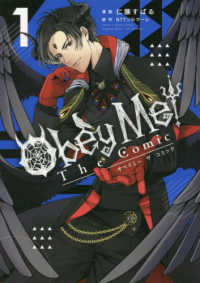- ホーム
- > 洋書
- > 英文書
- > Literary Criticism
Full Description
Reconsidering the German tendency to define itself vis-à-vis an eastern "Other" in light of fresh debate regarding the Second World War, this volume and the cultural products it considers expose and question Germany's relationship with its imagined East.
Germany has long defined itself in opposition to its eastern neighbors: its ideas around cultural prestige and its expressions of xenophobia seem inevitably to return to an imagined eastern "Other." Central to the consideration of such projections is the legacy of the Second World War, the subject of fresh debate since 1989: after four decades of political antagonism and cultural disjuncture, the events of the war on the Eastern Front have been rediscovered by Western audiences and have come to occupy complex, shifting positions in the memory culture of the postsocialist states. However, German ignorance of Eastern European experiences of war and genocide, enduring stereotypes, and prescriptive ideas about remembrance have been major stumbling blocks to the emergence of a transnational memory culture considered just by all parties.
Despite mass immigration to Germany from the east and intensive contact between German speakers and its cultures, German-language cultural production continues largely to represent Eastern Europe as unknown, wild, and inaccessible. By contrast, the writers and filmmakers under discussion in the present volume have worked with and against such tropes to put forward alternative perspectives. Like their works, the contributions to this volume place the conflicts and prejudices of the twentieth century into a wider historical perspective, exposing and questioning the nature of Germany's relationship with its imagined East.
Contributors: Deirdre Byrnes, Raluca Cernahoschi, Shivani Chauhan, Enikő Dácz, Olha Flachs, Daniel Harvey, Jakub Kazecki, Amy Leech, Paul Peters, Ernest Schonfield, Karolina Watroba.
Contents
Between Estrangement and Entanglement: An Introduction to German Visions of Eastern Europe in the Twentieth (and Twenty-First) Century - Jenny Watson
Colonizing a Central European City: Transnational Perspectives on Kronstadt/Brașov/Brassó in the First Half of the Twentieth Century - Enikő Dácz
Exile as a Literary-Political Mission: Leo Katz's Antifascist Bukovina Novel Totenjäger (1944) - Olha Flachs
Brunnenland: The Image of the Bukovina in Paul Celan - Paul Peters
"Auch bei uns im fernen Transsilvanien": The Transylvanian Saxons and the Long Shadow of the Third Reich in the Work of Bettina Schuller - Raluca Cernahoschi
Through an Orientalist Lens: Colonial Renderings of Poland in German Cinema after 1989 - Jakub Kazecki
The Nazi Ghost and the Sinti Woman in Kerstin Hensel's Bell Vedere (1982) - Ernest Schonfield
The Haunted Landscape of Babi Yar: Memory, Language, and the Exploration of Holocaust Spaces in Katja Petrowskaja's Vielleicht Esther (2014) - Deirdre Byrnes
"dann hüpfe ich auch, komisch und ungeschickt, wie eine Nadel auf einer abgespielten Platte...": The Ethics and Affects of Translation in Katja Petrowskaja's Vielleicht Esther (2014) - Daniel Harvey
Expanding the Nationalgeschichte: Entangled European Memory in Nino Haratischwili and Saša Stanišić - Amy Leech
Reading Photographic Images and Identifying Mnemonic Threads of the Post-Memorial Project in Sie kam aus Mariupol (2017) by Natascha Wodin - Shivani Chauhan
Navid Kermani's Entlang den Gräben (2018) and Its Readers: Remapping Europe's East - Karolina Watroba








